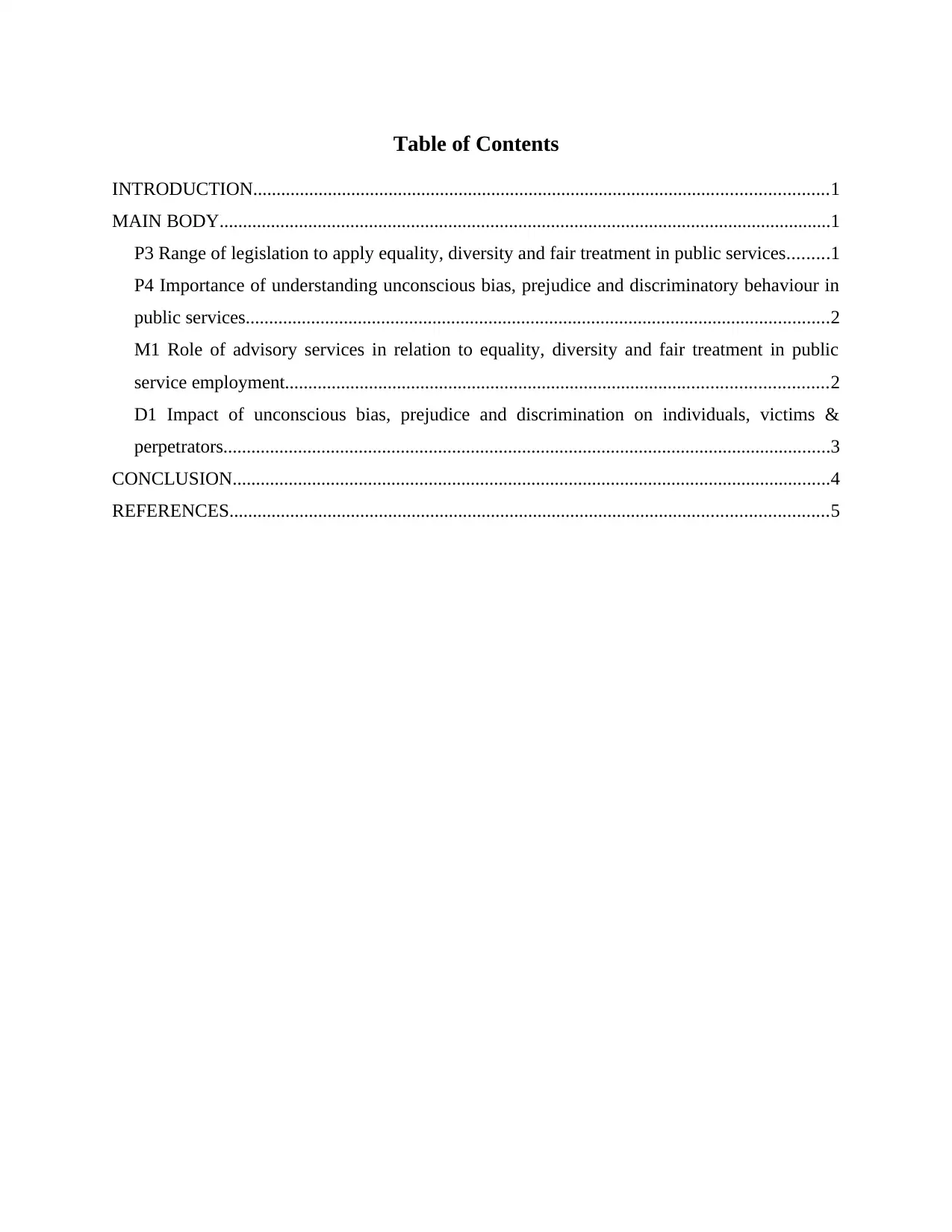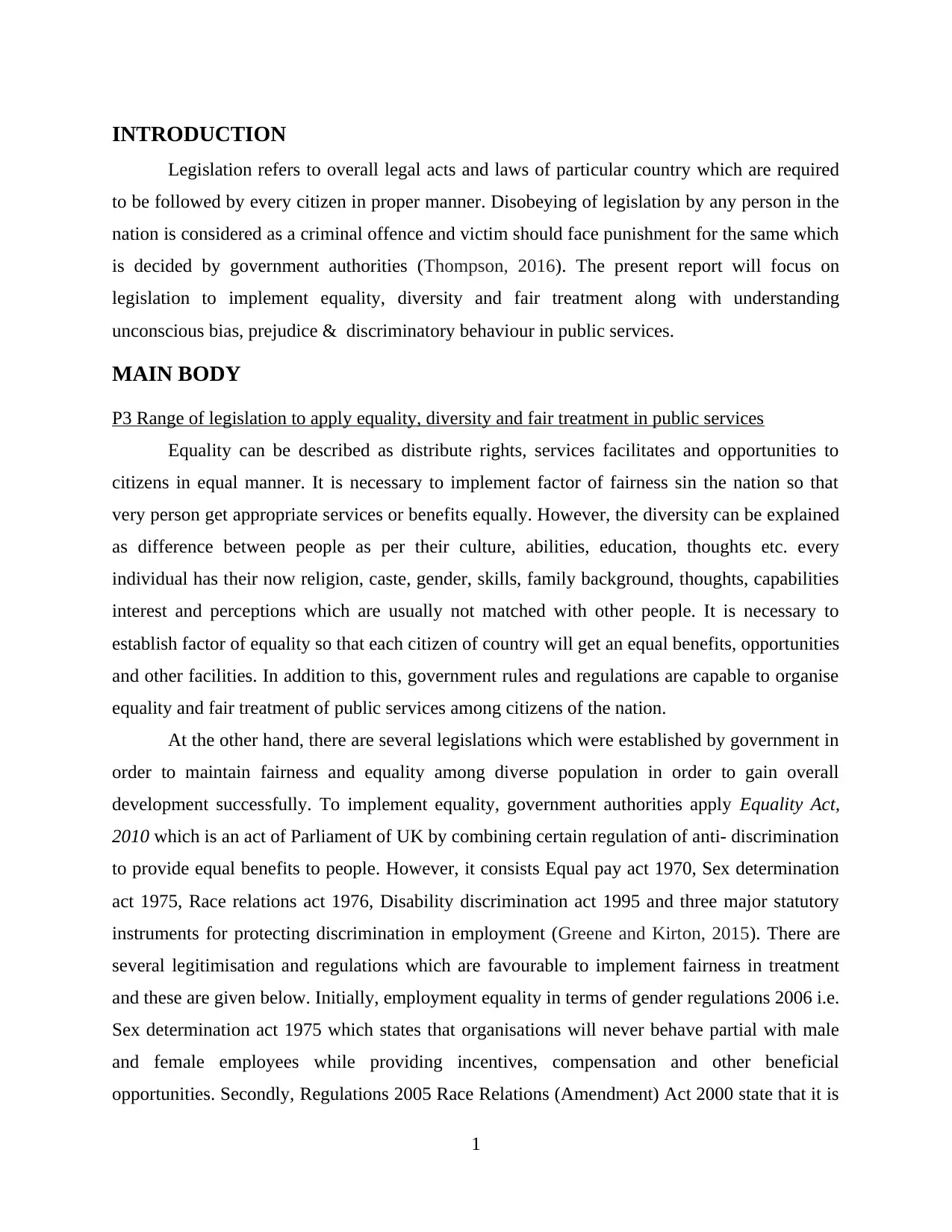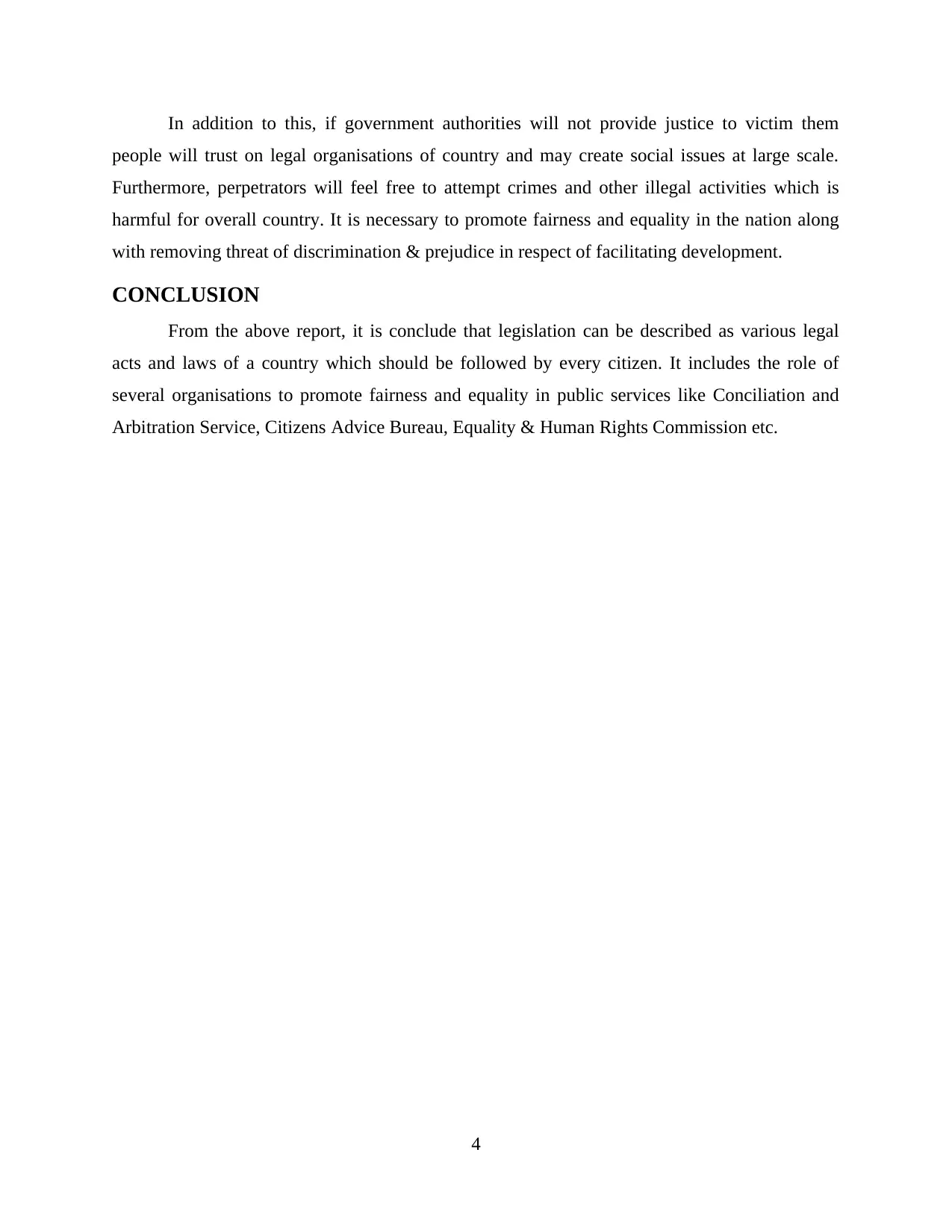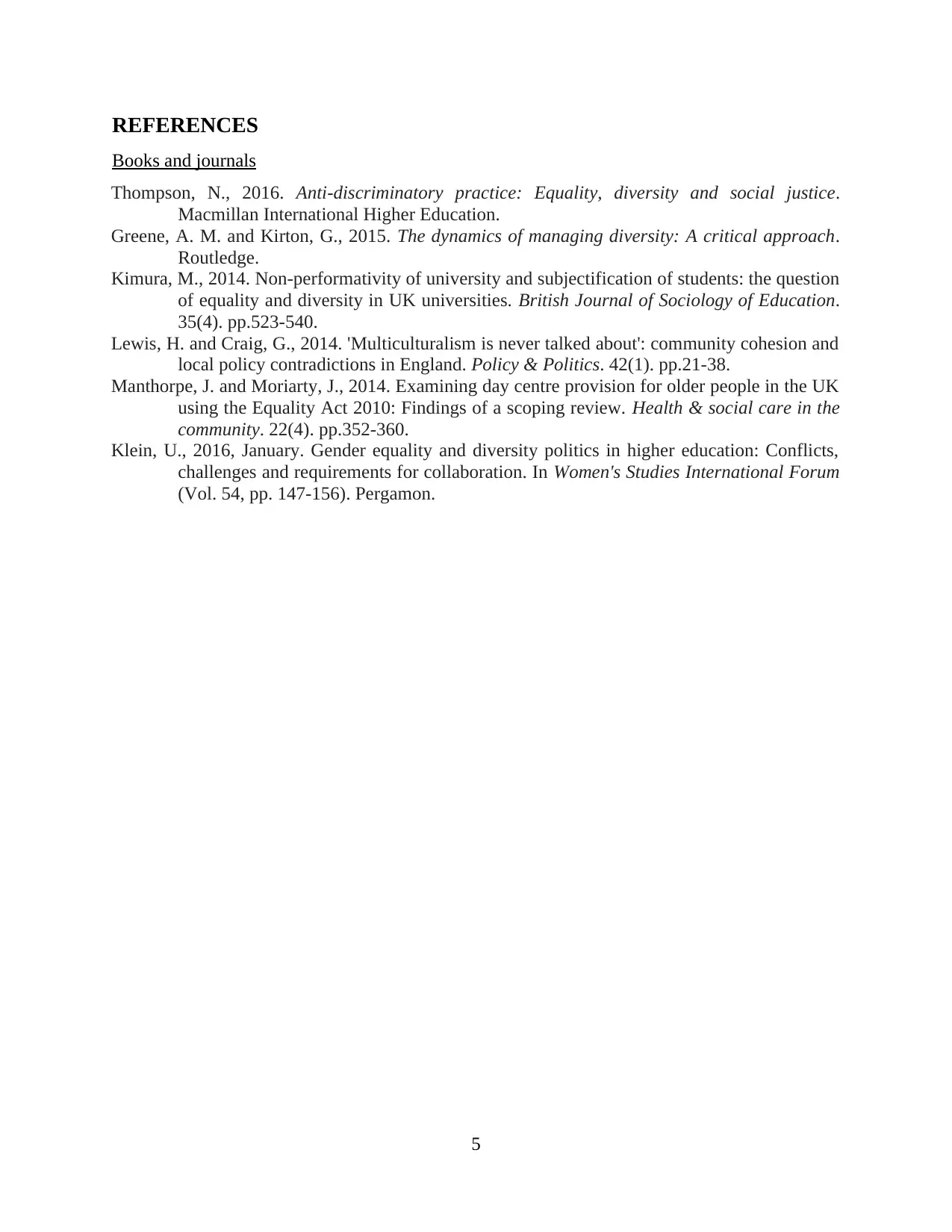Equality and Diversity in Public Services: Legislation Report
VerifiedAdded on 2020/11/12
|7
|1731
|256
Report
AI Summary
This report delves into the crucial aspects of legislation designed to foster equality, diversity, and fair treatment within public services. It begins by defining equality and diversity and highlights the importance of various legislations such as the Equality Act 2010 and related acts, emphasizing their role in ensuring equal benefits and opportunities for all citizens, regardless of their background. The report then explores the significance of understanding unconscious bias, prejudice, and discriminatory behavior, explaining how these factors can undermine fair treatment and hinder societal development. Furthermore, it examines the role of advisory services, including organizations like ACAS, CAB, and EHRC, in promoting equality and fair practices in employment and public services. Finally, the report analyzes the negative impact of unconscious bias, prejudice, and discrimination on individuals, victims, and perpetrators, concluding with the importance of promoting fairness and equality through effective legislation and advisory services to ensure overall societal development. The report provides a comprehensive overview of the legal framework and its practical implications in creating a more equitable and just society.

Legislation in Support of
Equality and Diversity
Equality and Diversity
Paraphrase This Document
Need a fresh take? Get an instant paraphrase of this document with our AI Paraphraser

Table of Contents
INTRODUCTION...........................................................................................................................1
MAIN BODY...................................................................................................................................1
P3 Range of legislation to apply equality, diversity and fair treatment in public services.........1
P4 Importance of understanding unconscious bias, prejudice and discriminatory behaviour in
public services.............................................................................................................................2
M1 Role of advisory services in relation to equality, diversity and fair treatment in public
service employment....................................................................................................................2
D1 Impact of unconscious bias, prejudice and discrimination on individuals, victims &
perpetrators..................................................................................................................................3
CONCLUSION................................................................................................................................4
REFERENCES................................................................................................................................5
INTRODUCTION...........................................................................................................................1
MAIN BODY...................................................................................................................................1
P3 Range of legislation to apply equality, diversity and fair treatment in public services.........1
P4 Importance of understanding unconscious bias, prejudice and discriminatory behaviour in
public services.............................................................................................................................2
M1 Role of advisory services in relation to equality, diversity and fair treatment in public
service employment....................................................................................................................2
D1 Impact of unconscious bias, prejudice and discrimination on individuals, victims &
perpetrators..................................................................................................................................3
CONCLUSION................................................................................................................................4
REFERENCES................................................................................................................................5

INTRODUCTION
Legislation refers to overall legal acts and laws of particular country which are required
to be followed by every citizen in proper manner. Disobeying of legislation by any person in the
nation is considered as a criminal offence and victim should face punishment for the same which
is decided by government authorities (Thompson, 2016). The present report will focus on
legislation to implement equality, diversity and fair treatment along with understanding
unconscious bias, prejudice & discriminatory behaviour in public services.
MAIN BODY
P3 Range of legislation to apply equality, diversity and fair treatment in public services
Equality can be described as distribute rights, services facilitates and opportunities to
citizens in equal manner. It is necessary to implement factor of fairness sin the nation so that
very person get appropriate services or benefits equally. However, the diversity can be explained
as difference between people as per their culture, abilities, education, thoughts etc. every
individual has their now religion, caste, gender, skills, family background, thoughts, capabilities
interest and perceptions which are usually not matched with other people. It is necessary to
establish factor of equality so that each citizen of country will get an equal benefits, opportunities
and other facilities. In addition to this, government rules and regulations are capable to organise
equality and fair treatment of public services among citizens of the nation.
At the other hand, there are several legislations which were established by government in
order to maintain fairness and equality among diverse population in order to gain overall
development successfully. To implement equality, government authorities apply Equality Act,
2010 which is an act of Parliament of UK by combining certain regulation of anti- discrimination
to provide equal benefits to people. However, it consists Equal pay act 1970, Sex determination
act 1975, Race relations act 1976, Disability discrimination act 1995 and three major statutory
instruments for protecting discrimination in employment (Greene and Kirton, 2015). There are
several legitimisation and regulations which are favourable to implement fairness in treatment
and these are given below. Initially, employment equality in terms of gender regulations 2006 i.e.
Sex determination act 1975 which states that organisations will never behave partial with male
and female employees while providing incentives, compensation and other beneficial
opportunities. Secondly, Regulations 2005 Race Relations (Amendment) Act 2000 state that it is
1
Legislation refers to overall legal acts and laws of particular country which are required
to be followed by every citizen in proper manner. Disobeying of legislation by any person in the
nation is considered as a criminal offence and victim should face punishment for the same which
is decided by government authorities (Thompson, 2016). The present report will focus on
legislation to implement equality, diversity and fair treatment along with understanding
unconscious bias, prejudice & discriminatory behaviour in public services.
MAIN BODY
P3 Range of legislation to apply equality, diversity and fair treatment in public services
Equality can be described as distribute rights, services facilitates and opportunities to
citizens in equal manner. It is necessary to implement factor of fairness sin the nation so that
very person get appropriate services or benefits equally. However, the diversity can be explained
as difference between people as per their culture, abilities, education, thoughts etc. every
individual has their now religion, caste, gender, skills, family background, thoughts, capabilities
interest and perceptions which are usually not matched with other people. It is necessary to
establish factor of equality so that each citizen of country will get an equal benefits, opportunities
and other facilities. In addition to this, government rules and regulations are capable to organise
equality and fair treatment of public services among citizens of the nation.
At the other hand, there are several legislations which were established by government in
order to maintain fairness and equality among diverse population in order to gain overall
development successfully. To implement equality, government authorities apply Equality Act,
2010 which is an act of Parliament of UK by combining certain regulation of anti- discrimination
to provide equal benefits to people. However, it consists Equal pay act 1970, Sex determination
act 1975, Race relations act 1976, Disability discrimination act 1995 and three major statutory
instruments for protecting discrimination in employment (Greene and Kirton, 2015). There are
several legitimisation and regulations which are favourable to implement fairness in treatment
and these are given below. Initially, employment equality in terms of gender regulations 2006 i.e.
Sex determination act 1975 which states that organisations will never behave partial with male
and female employees while providing incentives, compensation and other beneficial
opportunities. Secondly, Regulations 2005 Race Relations (Amendment) Act 2000 state that it is
1
⊘ This is a preview!⊘
Do you want full access?
Subscribe today to unlock all pages.

Trusted by 1+ million students worldwide

necessary to provide equal benefits to every person having different colour, origin country, race,
ethnic and national origin. Thirdly, Employment Equality (Religion or Belief) Regulations 2003
Human Rights Act 1998 is helpful to protect people from discrimination to get public services on
the basis of different religions, culture as well as beliefs. Moreover, Employment Equality
(Sexual Orientation) Regulations 2003 Equality Act 2010 provide help in outlawing
discrimination in provision of goods, facilities, services, education and public functions on the
grounds of sexual orientation (Kimura, 2014).
P4 Importance of understanding unconscious bias, prejudice and discriminatory behaviour in
public services
Unconscious biases can be described as kind of social stereotypes about several groups
due to their unconscious beliefs for different tribes, gender, physical disability and other means.
It can be considered as far more prevalent than conscious prejudice and often incompatible with
an individual's personal values or thoughts. However, it is necessary to understand these
unconscious bias, prejudice and discriminatory behaviour because these are mostly unfair for the
people. Moreover, it is required to analyse unfair factors so that government can put efforts to
promote fair treatment and equal opportunities for every citizens of the nation. There are various
societal norms which are discriminatory for certain tribes or poor people which impact on their
lives as they do not desired public services and other chances to improve their living of
standards.
In addition to this, it is really significant to understand unconscious bias, prejudice and
discriminatory behaviour as it facilitate to know about negative values, beliefs or thoughts of
stereotypes. However, it will provide support to analyse about incorrect factors and related
problems which helps to make required rules & regulations to reduce the same. Moreover, efforts
for decreasing such problems in society which facilitate to promote fairness in public services so
that every citizen will get appropriate benefits (Lewis and Craig, 2014). Meanwhile, it is very
important remove threat of discriminatory behaviour in order to provide fair facilities to each
person which results into overall development of the country.
M1 Role of advisory services in relation to equality, diversity and fair treatment in public service
employment
The advisory management services are responsible for allowing private individuals to
consult with investment professionals before making modification sin their respective portfolios.
2
ethnic and national origin. Thirdly, Employment Equality (Religion or Belief) Regulations 2003
Human Rights Act 1998 is helpful to protect people from discrimination to get public services on
the basis of different religions, culture as well as beliefs. Moreover, Employment Equality
(Sexual Orientation) Regulations 2003 Equality Act 2010 provide help in outlawing
discrimination in provision of goods, facilities, services, education and public functions on the
grounds of sexual orientation (Kimura, 2014).
P4 Importance of understanding unconscious bias, prejudice and discriminatory behaviour in
public services
Unconscious biases can be described as kind of social stereotypes about several groups
due to their unconscious beliefs for different tribes, gender, physical disability and other means.
It can be considered as far more prevalent than conscious prejudice and often incompatible with
an individual's personal values or thoughts. However, it is necessary to understand these
unconscious bias, prejudice and discriminatory behaviour because these are mostly unfair for the
people. Moreover, it is required to analyse unfair factors so that government can put efforts to
promote fair treatment and equal opportunities for every citizens of the nation. There are various
societal norms which are discriminatory for certain tribes or poor people which impact on their
lives as they do not desired public services and other chances to improve their living of
standards.
In addition to this, it is really significant to understand unconscious bias, prejudice and
discriminatory behaviour as it facilitate to know about negative values, beliefs or thoughts of
stereotypes. However, it will provide support to analyse about incorrect factors and related
problems which helps to make required rules & regulations to reduce the same. Moreover, efforts
for decreasing such problems in society which facilitate to promote fairness in public services so
that every citizen will get appropriate benefits (Lewis and Craig, 2014). Meanwhile, it is very
important remove threat of discriminatory behaviour in order to provide fair facilities to each
person which results into overall development of the country.
M1 Role of advisory services in relation to equality, diversity and fair treatment in public service
employment
The advisory management services are responsible for allowing private individuals to
consult with investment professionals before making modification sin their respective portfolios.
2
Paraphrase This Document
Need a fresh take? Get an instant paraphrase of this document with our AI Paraphraser

It involves several advisory networks and committees which supports to maintain equality,
diversity and fair treatment There are different advisory services such as Conciliation and
Arbitration Service (ACAS) which is helpful improve organisations & working lives through
promotion and facilitation of strong industrial relations practice. However, Citizens Advice
Bureau (CAB) consist network of charities in order to provide correct advice to people of country
in terms of money, legal, consumer and other problems in equal manner so that every person
gain proper services. Moreover, Equality and Human Rights Commission (EHRC) including
Rights of women which is helpful to ensure that every person will get equal rights to gain
desired opportunities and services that is favourable for their respective lives (Manthorpe and
Moriarty, 2014).
In addition to this, Royal Association for Disability and Rehabilitation (RADAR) which
plays an important role to protect rights of disabled people in order to provide them equal as well
as fair public services appropriately. Meanwhile, Trade unions refers to helping organisation of
labours or workers in terms of providing them fair benefits, wages, improve their standards and
protecting integrity of it trade. Moreover, Liberty Human Rights involves the criteria to give
liberty of every citizen for their physical freedom which promote equality as well as fairness. At
the other hand, Inspectorates and advisory bodies such as Independent Police Complaints
Commission (IPCC)/Office for Police Conduct and Independent Monitoring Board (IMB) for
Prisons also facilitate to ensure equality & fairness. Furthermore, these organisations plays an
important role to ensure fairness and equality in respect of protecting rights of people along with
providing them desired facilities.
D1 Impact of unconscious bias, prejudice and discrimination on individuals, victims &
perpetrators
The unconscious bias, prejudice & discrimination on individuals, victims and perpetrators
is negative manner. These partial and discriminatory behaviour impacts negatively on
individuals, victims and perpetrators in order to not provide their correct results. However, due to
unconscious bias victims get suffered more because they did not get justice for accidents which
have face by them due to that reason people will stop trusting on desired authorities in future
(Klein, 2016). Moreover, if a superior attempt bullying of their sub- ordinates then
discriminating behaviour of higher authority will not take appropriate actions the perpetrators
due to which victims will face much more problems in future.
3
diversity and fair treatment There are different advisory services such as Conciliation and
Arbitration Service (ACAS) which is helpful improve organisations & working lives through
promotion and facilitation of strong industrial relations practice. However, Citizens Advice
Bureau (CAB) consist network of charities in order to provide correct advice to people of country
in terms of money, legal, consumer and other problems in equal manner so that every person
gain proper services. Moreover, Equality and Human Rights Commission (EHRC) including
Rights of women which is helpful to ensure that every person will get equal rights to gain
desired opportunities and services that is favourable for their respective lives (Manthorpe and
Moriarty, 2014).
In addition to this, Royal Association for Disability and Rehabilitation (RADAR) which
plays an important role to protect rights of disabled people in order to provide them equal as well
as fair public services appropriately. Meanwhile, Trade unions refers to helping organisation of
labours or workers in terms of providing them fair benefits, wages, improve their standards and
protecting integrity of it trade. Moreover, Liberty Human Rights involves the criteria to give
liberty of every citizen for their physical freedom which promote equality as well as fairness. At
the other hand, Inspectorates and advisory bodies such as Independent Police Complaints
Commission (IPCC)/Office for Police Conduct and Independent Monitoring Board (IMB) for
Prisons also facilitate to ensure equality & fairness. Furthermore, these organisations plays an
important role to ensure fairness and equality in respect of protecting rights of people along with
providing them desired facilities.
D1 Impact of unconscious bias, prejudice and discrimination on individuals, victims &
perpetrators
The unconscious bias, prejudice & discrimination on individuals, victims and perpetrators
is negative manner. These partial and discriminatory behaviour impacts negatively on
individuals, victims and perpetrators in order to not provide their correct results. However, due to
unconscious bias victims get suffered more because they did not get justice for accidents which
have face by them due to that reason people will stop trusting on desired authorities in future
(Klein, 2016). Moreover, if a superior attempt bullying of their sub- ordinates then
discriminating behaviour of higher authority will not take appropriate actions the perpetrators
due to which victims will face much more problems in future.
3

In addition to this, if government authorities will not provide justice to victim them
people will trust on legal organisations of country and may create social issues at large scale.
Furthermore, perpetrators will feel free to attempt crimes and other illegal activities which is
harmful for overall country. It is necessary to promote fairness and equality in the nation along
with removing threat of discrimination & prejudice in respect of facilitating development.
CONCLUSION
From the above report, it is conclude that legislation can be described as various legal
acts and laws of a country which should be followed by every citizen. It includes the role of
several organisations to promote fairness and equality in public services like Conciliation and
Arbitration Service, Citizens Advice Bureau, Equality & Human Rights Commission etc.
4
people will trust on legal organisations of country and may create social issues at large scale.
Furthermore, perpetrators will feel free to attempt crimes and other illegal activities which is
harmful for overall country. It is necessary to promote fairness and equality in the nation along
with removing threat of discrimination & prejudice in respect of facilitating development.
CONCLUSION
From the above report, it is conclude that legislation can be described as various legal
acts and laws of a country which should be followed by every citizen. It includes the role of
several organisations to promote fairness and equality in public services like Conciliation and
Arbitration Service, Citizens Advice Bureau, Equality & Human Rights Commission etc.
4
⊘ This is a preview!⊘
Do you want full access?
Subscribe today to unlock all pages.

Trusted by 1+ million students worldwide

REFERENCES
Books and journals
Thompson, N., 2016. Anti-discriminatory practice: Equality, diversity and social justice.
Macmillan International Higher Education.
Greene, A. M. and Kirton, G., 2015. The dynamics of managing diversity: A critical approach.
Routledge.
Kimura, M., 2014. Non-performativity of university and subjectification of students: the question
of equality and diversity in UK universities. British Journal of Sociology of Education.
35(4). pp.523-540.
Lewis, H. and Craig, G., 2014. 'Multiculturalism is never talked about': community cohesion and
local policy contradictions in England. Policy & Politics. 42(1). pp.21-38.
Manthorpe, J. and Moriarty, J., 2014. Examining day centre provision for older people in the UK
using the Equality Act 2010: Findings of a scoping review. Health & social care in the
community. 22(4). pp.352-360.
Klein, U., 2016, January. Gender equality and diversity politics in higher education: Conflicts,
challenges and requirements for collaboration. In Women's Studies International Forum
(Vol. 54, pp. 147-156). Pergamon.
5
Books and journals
Thompson, N., 2016. Anti-discriminatory practice: Equality, diversity and social justice.
Macmillan International Higher Education.
Greene, A. M. and Kirton, G., 2015. The dynamics of managing diversity: A critical approach.
Routledge.
Kimura, M., 2014. Non-performativity of university and subjectification of students: the question
of equality and diversity in UK universities. British Journal of Sociology of Education.
35(4). pp.523-540.
Lewis, H. and Craig, G., 2014. 'Multiculturalism is never talked about': community cohesion and
local policy contradictions in England. Policy & Politics. 42(1). pp.21-38.
Manthorpe, J. and Moriarty, J., 2014. Examining day centre provision for older people in the UK
using the Equality Act 2010: Findings of a scoping review. Health & social care in the
community. 22(4). pp.352-360.
Klein, U., 2016, January. Gender equality and diversity politics in higher education: Conflicts,
challenges and requirements for collaboration. In Women's Studies International Forum
(Vol. 54, pp. 147-156). Pergamon.
5
1 out of 7
Related Documents
Your All-in-One AI-Powered Toolkit for Academic Success.
+13062052269
info@desklib.com
Available 24*7 on WhatsApp / Email
![[object Object]](/_next/static/media/star-bottom.7253800d.svg)
Unlock your academic potential
Copyright © 2020–2026 A2Z Services. All Rights Reserved. Developed and managed by ZUCOL.




